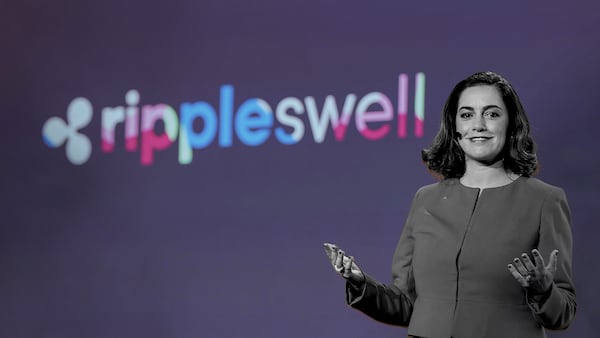A version of this story appeared in our The Guidance newsletter. If you want to read this or our other newsletters before your friends do, don’t hesitate to sign up.
Hello! Joanna here with your Monday morning dose of crypto reg news and analysis.
A few weeks back, the cryptosphere celebrated a landmark judgement on Ripple’s associated token XRP.
But another judge’s decision last week to allow the Securities and Exchange Commission’s lawsuit against Terraform Labs to go ahead seems to pour cold water on some of the industry’s optimism.
‘Just as this court explicitly rejected the approach of the XRP ruling, another court could explicitly reject this decision just as easily’
— Teresa Goody Guillén
If you were a crypto litigant watching the Terraform ruling with disappointment, despair not. A top crypto lawyer says the legal arguments derived from the XRP ruling will still sway other judges.
“Just as this court explicitly rejected the approach of the XRP ruling, another court could explicitly reject this decision just as easily,” Teresa Goody Guillén, a partner at law firm BakerHostetler and a former litigation counsel for the SEC, told me.
If you weren’t watching this case, here is some background
The SEC is suing Singapore-based Terraform Labs and its co-founder Do Hyeong Kwon for multi-billion dollar securities fraud.
Terraform is best known as the creator of the Terra stablecoin and its currency LUNA, both of which crashed spectacularly in May last year.
NOW READ: Was this Do Kwon’s getaway jet to Dubai?
Kwon is also facing a range of other fraud and related charges in a number of countries, including his native South Korea. He went on the lam last year, but was arrested in Montenegro in March.
Our investigative team did a brilliant job tracking him down during the saga. You can read more of their coverage here.

When it comes to the SEC’s lawsuit, though, the regulator is alleging that Terraform marketed and sold unregistered securities, including LUNA, to investors.
NOW READ: Do Kwon’s new home: an overcrowded Balkan prison with mafia suspects and little hope
These allegations echo those made against other crypto businesses, including Coinbase, Binance, and Ripple Labs.
Terraform’s lawyers tried to get Judge Jed Rakoff to throw the SEC suit out of court. They pointed to the recent XRP ruling in the Ripple case to bolster their argument.
In that ruling in mid-July, a judge found that sales of Ripple’s XRP tokens were only sometimes illegal transactions — that is, they were illegal when sold to institutional investors, and legal when sold to the public via exchanges.
That sounds like an equivocal win, and it was. But crypto hasn’t had much of any kind of win lately, what with the SEC’s slew of lawsuits. So the industry is hoping the courts will rein in the regulator.
Lots of hopes were pinned especially on the Ripple ruling to be a test case or a precedent-setter.
If the judge ruled that XRP was not a security, that would give pro-crypto litigants some extra ammo in their own lawsuits.
But in the Terraform Labs case, Rakoff explicitly rejected the XRP ruling’s logic, and opted not to throw out the suit.
Rakoff said that the SEC had made a good case that Terraform marketed its digital assets as profitable investments, and therefore should have registered them as securities.
After Rakoff’s decision, there was some consternation in the cryptosphere.
It seemed that the Ripple case was not going to set ironclad precedent just yet.
But Guillén said all is not lost for Terraform
Judges’ decisions aren’t binding on other judges, she said. Even within this case itself, there will be another opportunity to file a motion to dismiss or win a trial once the court has more evidence before it.
Also, Guillén said, Terraform’s broader argument — that if crypto companies are forced to register all digital assets under securities laws, blockchain networks would be rendered inoperable — still hold.
And many courts would accept the reasoning that a significant industry should not be hobbled by regulators.
NOW READ: Binance’s German license pullback may be ‘strategic choice’ as MiCA looms
To really drive home that point, Terraform’s lawyers invoked a principle called the major questions doctrine, which I have talked about in this newsletter before.
It’s basically the idea that agencies must not take it upon themselves to interpret the law and create their own rules willy nilly on significant areas of the economy.
Major questions has come into vogue recently in the Supreme Court as a way of limiting the power of the executive branch.
And pro-crypto litigators see it as one tool of reining in the SEC. The doctrine has popped up in a number of court battles against the SEC, including Coinbase’s.
Rakoff rejected that argument too, saying that major questions did not apply to Terraform’s case because the crypto industry is not major.
But here too, Guillén would beg to differ. If crypto is not a major industry, why is it so hotly debated in Congress, why are the SEC and Commodity Trading Futures Commission jockeying for control of it, and why is Congress working on at least 15 crypto law proposals, she said.
NOW READ: Bittrex Global CEO Oliver Linch on his company’s lawsuit and why US crypto reg is everyone’s concern
Rakoff did not make it clear what he meant by the cryptocurrency industry, she said. If you include in that definition the broader blockchain industry — “which is a layer of technology on top of many industries” — that is a very significant industry indeed.
These are all arguments that could sway other judges, even if they did not sway Rakoff, she said. Crypto litigants should continue to deploy them in fighting regulators.
“That lends support to the proposition that the blockchain industry is of vast economic and political significance, or that the SEC’s interpretation of its regulatory power is beyond the statutory scope and the major questions doctrine should apply here — that it’s an issue Congress should decide, not an agency.”
Do you have any opinions on crypto reg you’d care to share? Email me joanna@dlnews.com or find me on Telegram @joannallama.





